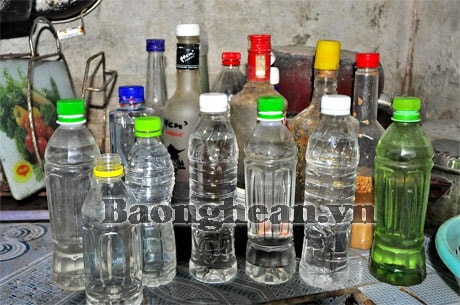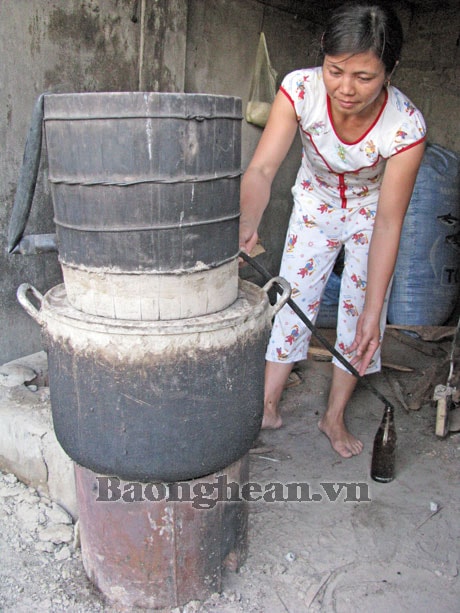Wine production and business management: Advantages and disadvantages?
(Baonghean) -From January 1, 2013, Decree 94/2012/ND-CP of the Government on the production and trading of alcohol has officially taken effect. Accordingly, all types of "country" alcohol that are hand-brewed and are being sold publicly and widely in all regions will be handled if they do not apply for a production license, labeling...
Nghi An Commune (Vinh City) - one of the localities with a long-standing wine-making profession. It is known that the whole commune currently has more than 40 households specializing in wine-making, mainly selling to regular customers, importing to restaurants in the commune, Vinh City and Ha Tinh.
Country wine is chosen by customers.
Nghi An wine is made from sticky rice, is famous for its delicious taste, smooth drinking, and characteristic aroma. Mr. Nguyen Dinh Truc - Vice Chairman of Nghi An commune said: The commune's orientation is to build the Nghi An wine brand. In addition to craft villages specializing in producing ornamental plants, the wine making profession in Nghi An has brought significant income to the people. Up to this point, Nghi An has not yet received instructions from superiors on the implementation of Decree 94 of the Prime Minister. In order for the decree to come into life, in the coming time, Nghi An will have measures to tighten the management of the wine making profession in the area. And to affirm the quality of wine, Nghi An is also ready to work with relevant departments and branches to build a craft village specializing in wine making.
People still make wine in the traditional way.
As one of the households that has preserved the wine-making profession for many generations, Bao Ngoc - Nghi An winery consumes over 20 kg of sticky rice every day, equivalent to about 15 liters of wine, each liter costs 30,000 VND. Because it has been famous for a long time, the owner of the establishment does not have to import it, but customers call to order and pick it up at home. When we asked about Decree 94, the owner of the establishment still did not know. "We have not heard of Decree 94 and do not pay attention. Our wine is brewed in the traditional way so the quality is always guaranteed. We mainly serve regular customers... Once the Decree is issued, the local government must be responsible for instructing people on how to avoid banning their country wine!...". Currently, it is near the Lunar New Year - which can be said to be the business season for those who specialize in wine making, so most families in Nghi An still increase cooking to serve the consumption demand during this peak season.
Not only do people from the countryside use country wine, but even large and small restaurants in Vinh City currently mainly sell country wine. Many customers who come to these restaurants only choose "banana leaf cork" wine to drink. The owner of the Lang Viet restaurant - No. 183, Phong Dinh Cang Street - Vinh City, said: "In the past, many diners were very fond of foreign wine, but in recent years, due to the quality of foreign wine not being guaranteed, especially a series of cases of counterfeiting foreign wine being arrested, at the request of many diners, recently, our restaurant mainly sells "country" wines from reputable establishments... However, if Decree 94 of the Government aims to tighten the management of country wines, it is also a good thing, because then importers like us and customers will also feel more secure when using country wines with quality warranty labels". Researching other restaurants in the area, they all had the same opinion: The price of local wine is cheaper than other branded wines, but they are all popular. When asked about food safety quality, they all affirmed that although the wine has no label, it is imported directly from a familiar source, so the quality is guaranteed. Researching at the Department of Food Safety and Hygiene, the Department sends annual instructions to report on poisoning cases in the whole province, but most districts do not have data reporting on poisoning cases from alcohol.
According to the Department of Industry and Trade: Under the direction of the Provincial People's Committee on the implementation of Decree 94 of the Prime Minister, the Department has sent an official dispatch to the Departments of Industry and Trade of districts across the province to guide the implementation of the main contents of the decree. However, to properly implement the decree is also very difficult for managers and even for small-scale wine traders.
In my opinion, Decree 94 above is a correct and timely policy of the Government to help the wine market become healthier and prevent unpredictable dangers from wine that does not guarantee quality, affecting people's health. However, for small-scale wine-making households, or households in regions with a tradition of wine-making, relevant departments and sectors need to have specific instructions for localities to create conditions for households to be able to register to produce wine in accordance with better standards.
Thanh Thuy






